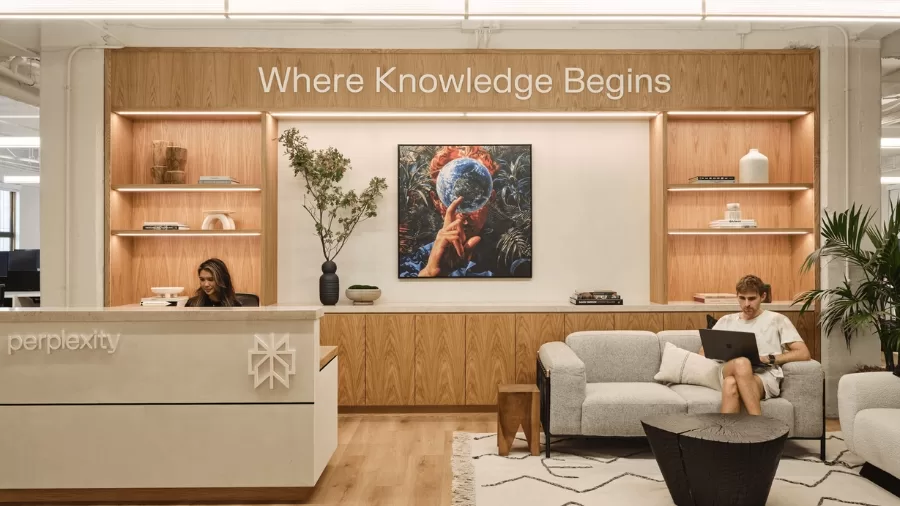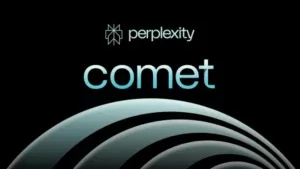The $14 Billion AI Bet: Can Perplexity Challenge Google’s Grip?

- The company is offering commercial direct AI alternatives to search engines, paid for by advertising. It has secured over $415 million in funding and is seeking a valuation of about $14 billion.
- With its transparent answer engine and backing from giants of tech and their allied firms, the startup represents the next onset in the life cycle of search engines.
New players rarely come around with a real potential to disrupt the incumbents in the crammed and competitive search engine market. Yet, it seems Perplexity AI is trying to do just that, and the early indicators show that the challenge to Google might carry weight.
Having been founded by ex-OpenAI and Meta engineers, Perplexity AI has raised over $415 million, but some estimates go up to $915 million after securing $500 million in its latest round. With a valuation of $9 billion as of December 2024, a $14 billion ceiling has now reportedly come into view. Backers include major names like Jeff Bezos, Nvidia, Institutional Venture Partners (IVP), and New Enterprise Associates (NEA).
Perplexity’s proposition is basic, yet data-driven: to offer users real-time answers created by AIs with proper citation of named sources, unlike the link-heavy, advertisement-riddled experience that users have gotten so used to from traditional search engines.
What Sets Perplexity Apart from Traditional Search Engines?
The mechanism behind Perplexity compares very differently to Google. Google’s model emphasises visitors clicking through multiple listings in which ads and SEO-optimised content may reside. Perplexity tries to bypass this by delivering clean answers to user queries with endorsed references that a user may trace back to information statements.
Perplexity is not concerned with keeping the user in its ecosystem for long periods; rather, it cares about getting the right answer. The AI responds to natural language questions, providing contextual information and allowing follow-up questions to be asked. This falls under the same umbrella as ChatGPT or Wikipedia; on the other hand, it is geared particularly toward real-time online searching.
Who’s Leading the Charge at Perplexity?
At the helm of Perplexity AI is CEO Aravind Srinivas, formerly with OpenAI, along with co-founder Denis Yarats, who has a background in AI at Facebook. Together, they have assembled a team comprising top engineers and researchers from major tech firms, including Google, Meta, OpenAI, and Amazon.
This wave of experienced talent is not merely a reflection of Silicon Valley mobility. It signals belief in the mission Perplexity is pursuing—to change the way users access information. The company’s engineering-first culture, which prioritises fast development cycles and public user feedback, is becoming a defining characteristic.
Google’s Position and the Emerging Risks
Google maintains a dominant position in the search space, accounting for more than 90% of the global search market. But this dominance is being increasingly tested. Advertising revenues have slowed, and shifts in consumer behaviour—particularly among Gen Z users who turn to platforms like TikTok and Reddit—suggest that the traditional model of web search may be losing relevance in some areas.
Meanwhile, Google’s integration of AI through its Gemini AI system has received mixed feedback. While the platform has demonstrated some notable use cases and strengths, it has also faced scrutiny and performance concerns in certain applications. The challenge for Google is balancing innovation with the sustainability of its ad-driven model.
What Users Are Experiencing with Perplexity
Early users of Perplexity have reported notable differences in their search experience. In London, product designer Sam describes using the platform for daily research tasks, stating that it saves him nearly 30 minutes a day. Similarly, Rina, a secondary school teacher in Birmingham, has found it useful for simplifying academic content and appreciates the clear citations that support verification.
These user experiences reflect a growing audience for an AI-driven, citation-focused search engine. Perplexity currently reports over 15 million monthly active users and over 150 million unique monthly visitors. The growth suggests these users are not only sampling the platform but also returning to it regularly.
Sustainability and Future Monetisation
Despite its promising trajectory, Perplexity faces operational challenges. Real-time data processing incurs significant costs, and brand recognition beyond early adopters remains limited. Moreover, without a built-in advertising model, questions persist about its long-term financial sustainability.
To address these issues, the company has begun introducing Pro features, including:
- Customizable AI personas
- Early access to new capabilities
- Integrations with premium data sources
These additions may help generate revenue and distinguish the product for power users.
Changing Search Habits and What Comes Next
While Perplexity is unlikely to replace Google in the immediate term, it is helping reshape user expectations. The appeal of transparent, ad-free, AI-generated answers suggests a new direction in how people engage with digital information.
The broader message for global brands and marketers is clear. As user behaviour shifts and new platforms gain traction, aligning with quality, trust, and clear communication is increasingly important.
Perplexity’s rise could signal not just competition in search but a larger transformation in the way digital knowledge is delivered and consumed.
As the platform continues to evolve, analysts and industry watchers will be closely monitoring whether Perplexity can sustain momentum and broaden its user base beyond tech-savvy early adopters. Strategic partnerships, global language support, and mobile-first experiences may play an essential role in expanding its relevance across diverse user segments.
Further questions emerge: Will traditional search engines adapt fast enough? Can advertising models evolve to support user-centric AI search? And how will regulators respond to the shift from indexed information to AI-curated knowledge?
These dynamics suggest that we are entering a new phase in digital discovery—one where simplicity, accuracy, and trustworthiness could overtake legacy dominance.









































